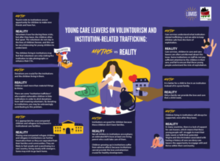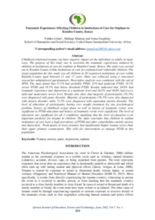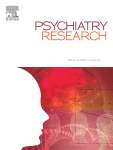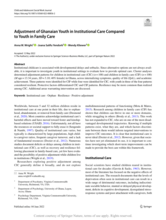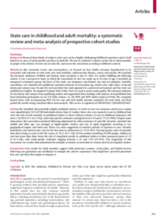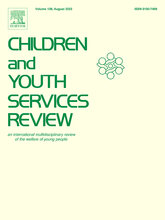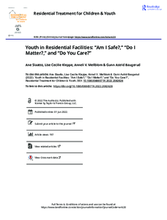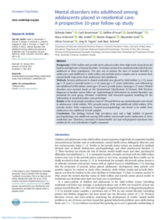Displaying 71 - 80 of 713
In this review, the authors detail the extent to which early deprivation affects mental health during vulnerable developmental periods, the capacity of family-based care to facilitate recovery from early deprivation, and the mechanisms underpinning these effects spanning social–emotional, cognitive, stress, and neurobiological domains.
Produced with KESCA, ‘Myths vs Reality’ highlights some of the key misconceptions associated with voluntourism, including how this could unintentionally support institution-related trafficking.
The purpose of this study was to ascertain the traumatic experiences endured by children in institutional care in Kiambu County, Kenya. The target population for this study was all children in 50 registered institutions of care within Kiambu County aged between 11 and 17 years.
This study investigated the prevalence of and factors associated with complete mental health (CMH) among a nationally representative sample of Canadians who had contact with child welfare services before age 16.
Institutional childcare is associated with developmental delays and setbacks. Since alternative options are not always available, it is important to investigate youth in institutional settings to evaluate how to provide optimal care.
Removal from family of origin to state care can be a highly challenging childhood experience and is itself linked to an array of unfavourable outcomes in adult life. This systematic review which included Canada, the US, western Europe, and Australia, aimed to synthetise evidence on the risk of adult mortality in people with a history of state care in early life, and assess the association according to different contexts.
This paper presents a case study that discusses the lived experiences of two LGBTQA + young people who have been in out-of-home care in Australia, focusing particularly on the influence of relationships on their developing sexual identity.
Several youth facilities have devoted considerable resources to improving the quality of practice and the interest in understanding the safety needs of youth in residential care has grown. However, there is limited research that considers how youth in residential facilities themselves define and experience safety, what their safety concerns are, and how they would like systems and staff to respond to their needs. Therefore, this current study investigated youth perceptions of safety in residential facilities in Norway and their experiences of and reaction to staff behaviors and attitudes.
Child welfare and juvenile justice placed youths show high levels of psychosocial burden and high rates of mental disorders. It remains unclear how mental disorders develop into adulthood in these populations. The aim of this study, based on adolescents in Swiss residential care, was to present the rates of mental disorders in adolescence and adulthood in child welfare and juvenile justice samples and to examine their mental health trajectories from adolescence into adulthood.
This article presents Kaupapa Māori research undertaken by a mokopuna Māori with the lived experience of state care in New Zealand, alongside established Kaupapa Māori researchers. Literature containing the voices of care-experienced mokopuna Māori was reviewed to explore what conditions exist and are needed to uphold wellbeing.

